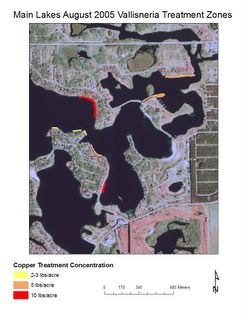Summit Labs Canadian Lakes Management
The Summit Labs Canadian Lake Management Blog was created to provide Canadian Lake Riparian owners better access to us, their lake managers. Communication is essential in successful lake management. Efficient communication allows us to maximize our time managing while satisfying riparians questions and concerns.
Wednesday, August 10, 2005
Monday, August 08, 2005
Time to Treat the Wid Celery
I can't believe it's already August! Where is the summer going? With all the hot, sunny and calm weather we have been experiencing throughout July, aquatic vascular plant control in the lakes has been a challenge to say the least. The final step in out aquatic vascular plant control for the 2005 season will be the Vallisneria americana (Wild Celery) treatment. Please refer to the previous Blog entitled "Wild Celery is Driving Us Wild" for more information on this native vascular aquatic plant. Working with our herbicide applicator, Norm Zion of Aquatic Nuisance Control, we will be treating the known Vallisneria trouble spots with (3) different experimental concentrations of a chelated copper algaecide. We are using a copper based algaecide because contact herbicides are not effective at selective control of Vallisneria. Additionally, there are no water use restrictions when using this family of chemicals. This experimental approach of using an algaecide was recommended to us by nationally renowned aquatic plant control expert, Bill Haller of the University of Florida. The above map details areas that will be treated and the experimental concentrations that will be applied. This treatment is experimental. There is no textbook cure for alleviating nuisance symptoms created by this native plant. By applying at three different concentrations, we will have the opportunity to evaluate achieved level of control. As time goes by, our ability to control native nuisance plants will evolve. If you have any questions, comments or concerns, please respond through the link on this page.
Your Lake Managers,
Joel Steenstra and Tom Krueger
Why am I Seeing so many Dead Bass on the Main Lakes?
The Main Chain of Canadian Lakes is experiencing an abnormally high mortality rate of adult largemouth bass during the last month or so. There is a possibility that this high mortality is related to one or more viruses these fish are susceptible to. Specimens will be sent to fish disease expert Dr. Faisal at MSU for professional verification of the presence or absence of one of the most common and life threatening of these viruses, Largemouth Bass Virus (LMBV). This virus has been detected in many southern MI lakes and some central county lakes. The virus is only fatal to bass when they are exposed to extreme environmental or angler related stress. If it is determined the virus is present in CL, it most likely will not have a major detrimental impact on the Main Lakes bass population as a whole. If the virus is detected, the annual Bass Tournament should be moved to earlier or later in the season to coincide with cooler water temps and anglers should minimize handling of fish during the warmer months.
At this point we can conclude that with or without the presence of a disease (LMBV), the Main Lakes are experiencing high adult bass (and the occasional pike, perch, crappie...) mortality. The high mortality is most likely related to the extremely (record setting) warm July. With daytime water temps approaching 90 degrees F and overnight dissolved oxygen levels falling into stress inducing low levels, these fish can succumb to the environmental stress, especially if they are infected with LMBV. Remember, the older fish have not had to struggle through a summer like this in years. Angling pressure is at its highest during the summer months as well. On the Saturday of the CL Bass Tournament, 100's of fish were handled on just that day alone. We would recommend that fisher people suspend any major catch and release fishing outings until the water temps come back down in Sept. This is most likely not an epidemic, viral testing will be conducted, the bass fishery will survive and remain intact, but unfortunately we will likely see continued high mortality of adult bass well into August. Please respond with any questions or comments through the link provided on this page. We want to express our appreciation to everyone who collected specimens; thank you and we can resume burying dead fish as we have an ample amount of sample specimens.
Your Lake Managers, Joel Steenstra and Tom Krueger


